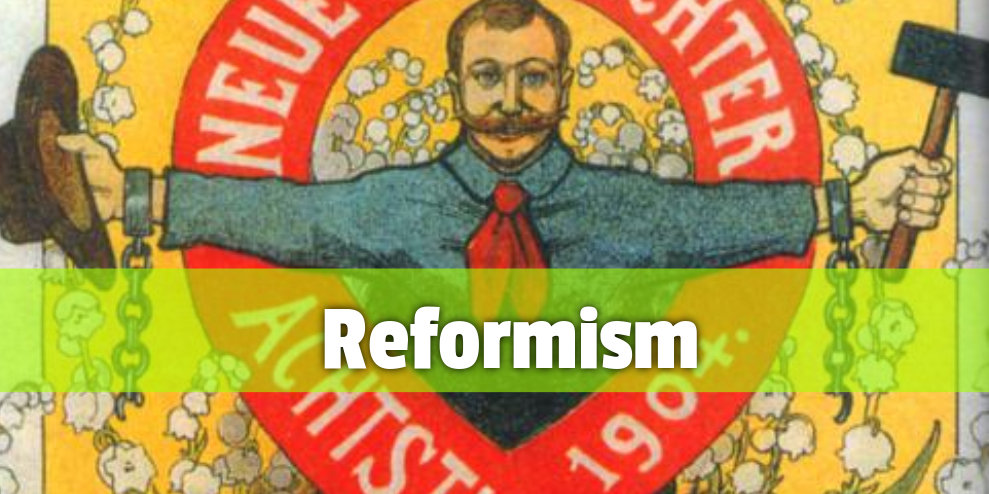Reformism

An opportunist current that developed within the Second International, advocating that through the struggle for lasting improvements and reforms - which were still possible - socialism could be achieved without going through a revolution.
Origins
The context of the Second International is still that of rising capitalism. In that historical period it was possible to achieve lasting improvements and legal reforms that would serve the affirmation of the class within a bourgeois society that could still give it its own political space. It is a period in which both parliamentarianism and the union can be tools for the constitution of the class as a political subject and in which the struggle for "reforms" such as the eight-hour day or universal suffrage
They awaken the proletariat to understanding, to socialist consciousness, and help it to organize as a class
Rosa Luxemburg. Reform and Revolution, 1903
In such a context, the parliamentary groups and above all the trade union leaderships will almost inevitably gain prestige and weight in the class, in spite of increasingly opportunistic drifts. These drifts gradually became more open as the monopolistic and totalitarian tendencies of the state under imperialism took hold. The foundations were being laid for what would later become state capitalism characteristic of decadence. Reformism was actually only a symptom that the trade unions and the social democratic parties themselves were being absorbed into the new organization of national capital in the state. In its most honest form reformism will recognize its break with Marxism and will openly present itself as revisionism, that is, as a result of the supposed overcoming of the contradictions of capitalism by capitalism itself.
Does reformism exist today?
What is commonly called "reformism" today, the policies of the parliamentary left, has nothing to do with what the classics of the Second International called it:
- The reformism of the Second International was an opportunistic tendency within the workers' movement; the socialist parties, the various descendants of stalinism or leftism of any stripe, are the result of tendencies that crossed the most basic class border, disavowing internationalism and participating in the worst massacres of workers in history a long time ago.
- That is, they are not expressions of mistakes or weaknesses in the development of class consciousness, but political elaborations of structures well integrated into the political apparatus of state capitalism in its various forms, that is, they are designed to defend the national state and wage labor.
- Reformism was the product of an era in which "reforms" meant real and lasting advances for the class, among other things because these were possible; the "reforms" we are told about today do not mean "advances" towards the decommodification of capitalist society, but, at best, "improvements" in its functioning that make it possible to avoid even more drastic worsening of the conditions of exploitation.
- And for the same reason, if reformism pretended to be able to reach socialism through reforms, that is, it pretended to be able to begin to effectively decommodify society; what today is called reformism sells us, in the best of cases, an impossible "sensitive", "compassionate" or "human" capitalism, not reforms as a way to overcome it.